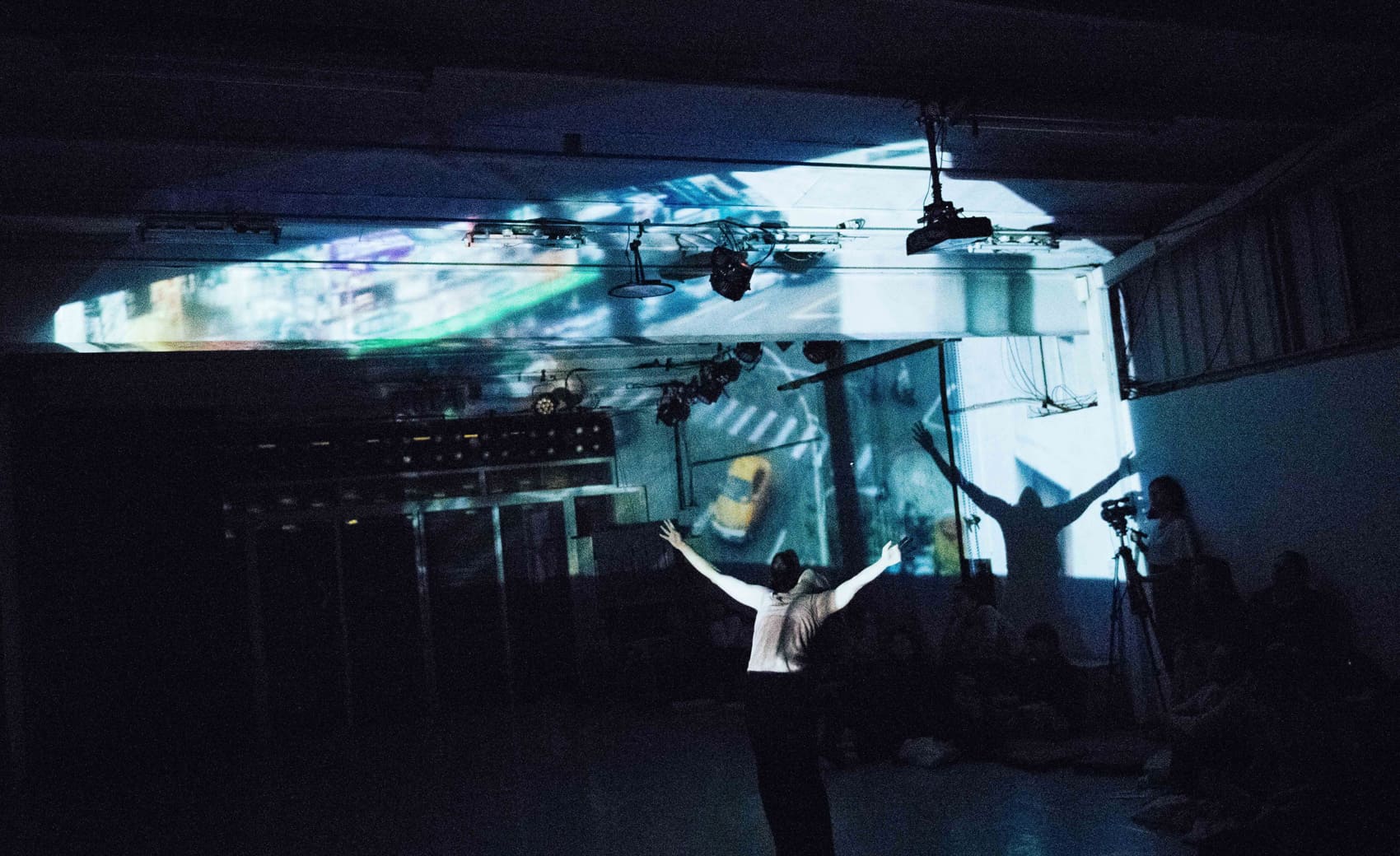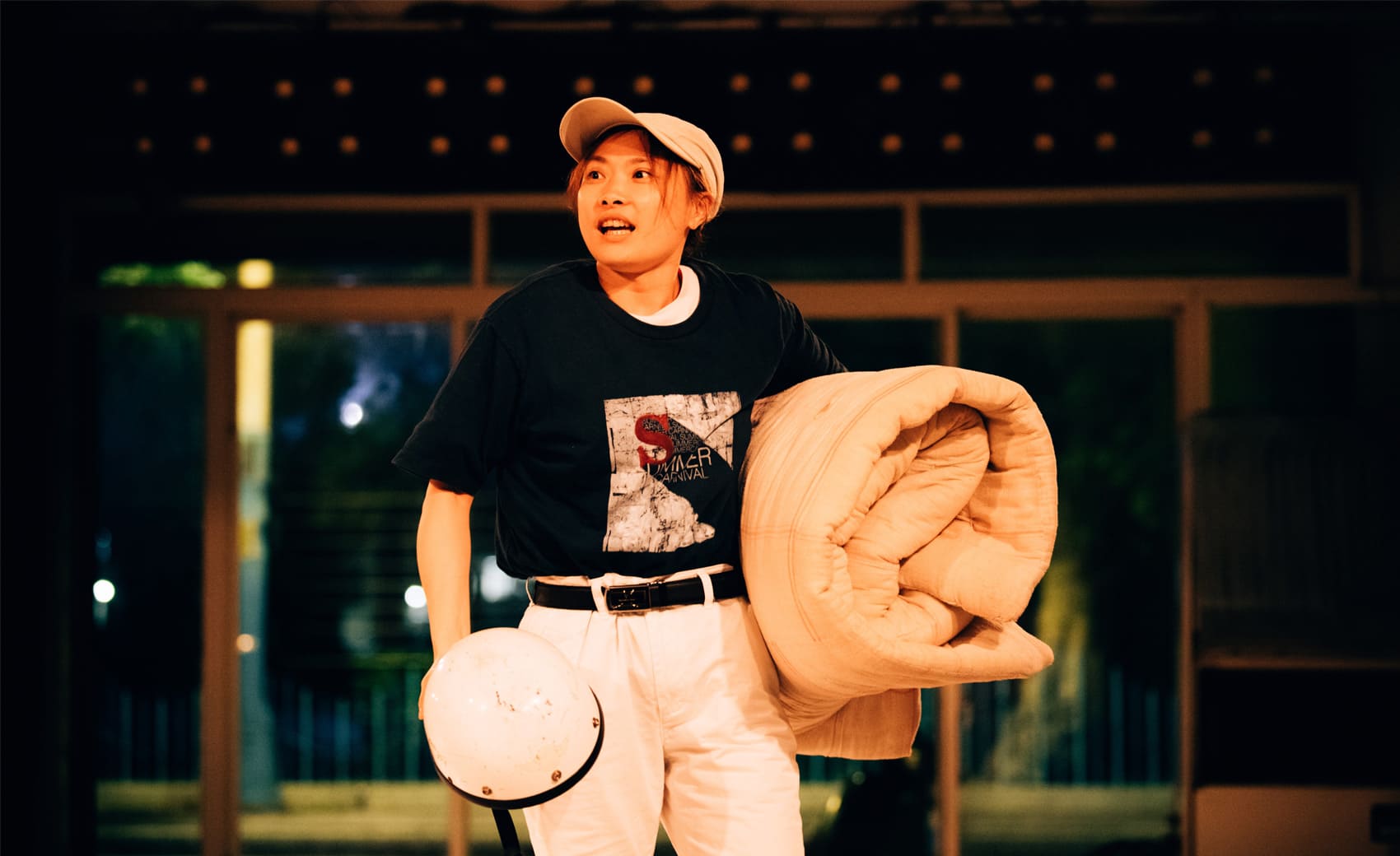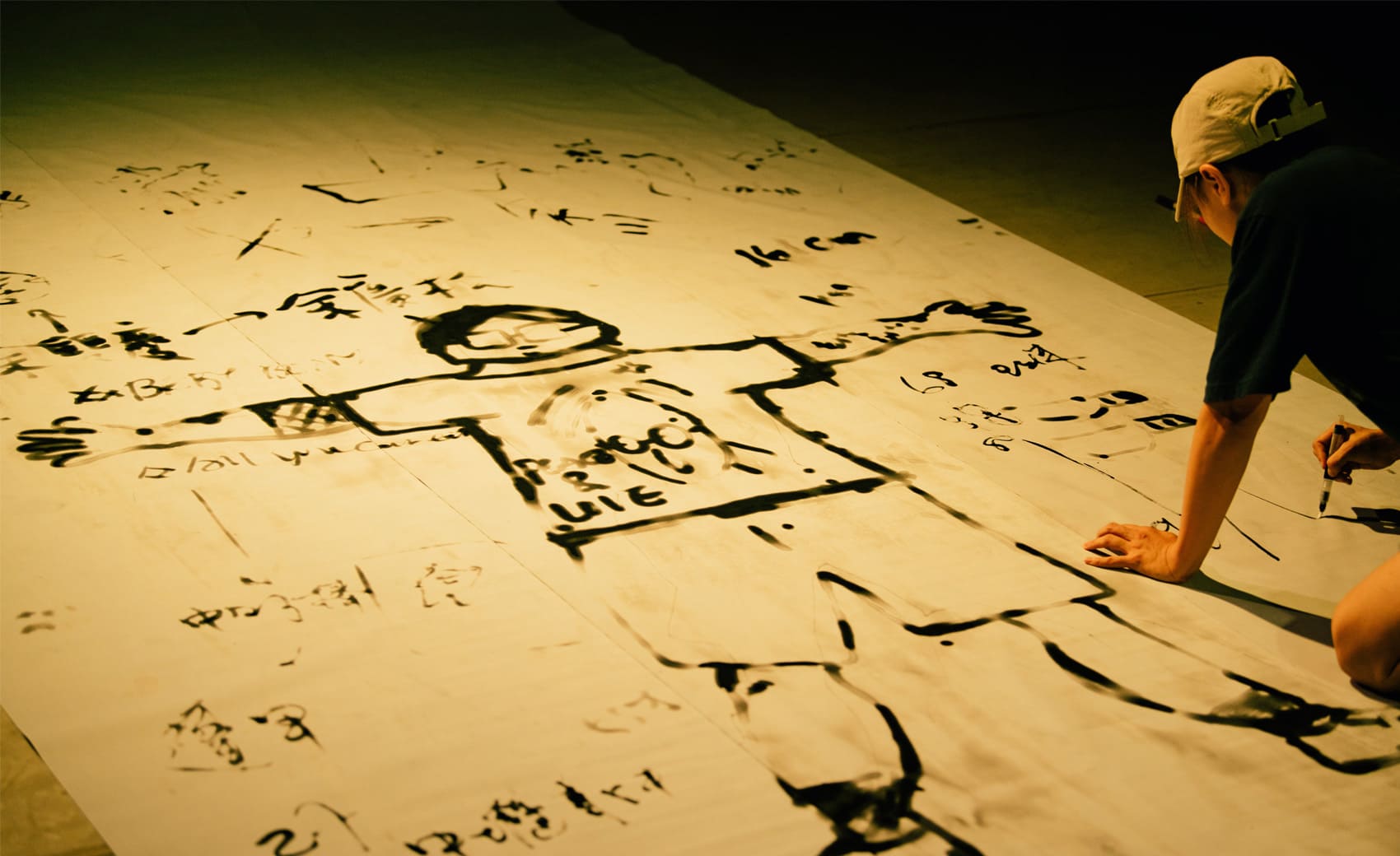「關於消失的幾個提議」系列創作為余彥芳於2011年開始,以獨舞形式呈現的肢體表演。第三部曲回歸關照個人身世,透過模擬父親說話的語調和示範身體的慣性與勞動,再現父親所屬的情感網絡與人際關係,重建他長年所在的場址與生活情狀。透過藝術形式的結合,以身體記憶感受失去,在演出與日常、台前與台後、再現與消逝的臨界轉場中,亦是一場讓自己與父親重會的舞作。作品特別邀請其他劇場藝術家參與,集結音樂、平面、空間、攝影、燈光、編舞等專才,建構出獨一無二的各式生活聲景,在轉換與獨舞之間,使父親的身體賦形而充實。
Propositions on Disappearance is a creative series featuring solo dance and physical performance created by Yu Yen-Fang since 2011. This work, as the third episode of the series, takes a retrospective look on her personal life, and represents her father’s emotional network and interpersonal relations through simulating his intonation of speech and demonstrating his physical traits and customary labor, while reconstructing the place that her father had lived and the scenarios of his life. Combining various art forms, Yu perceives loss with body memory; and in the liminal transition between performance and daily life, on stage and off stage as well as representation and disappearance, the work becomes a dance for the artist to reunite with her father. In particular, Yu invites other theater professionals to join this project, gathering talents of music, graphic art, space, photography, lighting and choreography, to create a unique soundscape of daily life. Through the transitions and her solo dance, the work embodies and substantiates the body of her father.
余彥芳
獨立表演、創作、教學者。長期關注台灣當代社會議題,以身體作為內化和投映土地故事與生命經驗的媒介,將深刻的感受轉化為抽象而詩意的舞蹈語彙。2013年起發起「默默計畫」,培養年輕表演者和跨領域團隊共同進行長期訓練和創作,2017年起開辦「默默工作坊」推廣即興舞蹈,並回歸獨立藝術家狀態,以多重身份穿梭在舞蹈、戲劇與現場展覽等演出形式當中,活躍於台灣與國際之間。 黑眼睛跨劇團 創立者為具詩人、導演、策展人、藝評等多重身份的鴻鴻,創團初始便積極引介主題形式創新的原創作品及世界重要經典劇作。原創作品多半觸碰及挑起對當代議題及社會禁忌的省思,並藉由接軌藝術實驗和大眾文化,打破劇場觀看的藩籬。多年來嘗試各種跨界與表演類型的開拓,培植新創人才共同推動藝術跨域實踐的核心價值。
YU Yen-Fang
Yu Yen-Fang is an independent performer, creator and educator, whose practice has centered on contemporary social issues in Taiwan for years. Using her body as a medium for internalizing and projecting stories from this land and the life experiences therein, she transforms deeply felt emotions into abstract, poetic dance vocabularies. In 2013, she launched “Project MuoMuo,” a long-term project that trains young performers to work with interdisciplinary teams. Since 2017, she has set up “Workshop MuoMuo” to promote dance improvisation. Now an independent artist, she freely moves between her roles in creating dance, drama and live exhibition, and remains active in Taiwan and the international performing arts scene. Dark Eyes Performance Lab Dark Eyes Performance Lab was founded by Hung Hung, a poet, director, curator and art critic. Since its establishment, the theater company has been actively introducing original works as well as adapting world classics with innovative themes and forms. Most of their original works touch upon and provoke thinking about contemporary issues and social taboos, and shatter the barrier of theater viewing by bridging artistic experimentation and mass culture. Over the years, Dark Eyes Performance Lab has endeavored in expanding the boundaries of interdisciplinary and performance works while nurturing creative talents to collectively promote the core value of interdisciplinary art practice.
余彥芳
歐陽文慧
蔣韜
高一華
洪千涵
鄒雅荃
蔣如、曾紹東
陳藝堂
莊知耕
王惠娟
陳珮文
劉依軒
連姵璇
方姿懿
驫舞劇場
關鍵字
- 余彥芳
- 關於消失的幾個提議
- 不用照片
- 我們如何思念一個人?
- 最看得懂的獨舞
- 印刻師父與他跳舞的女兒
藝術家談作品
「我的每個細胞剖面,都有過去、現在與未來。不只是我而已,是我們每一個人。這些東西像河流一樣流過我,也流過你的身體,我們每個人都承載了做為媒介(media)這件事情。」《關於消失的幾個提議Ⅲ》說的是以身體記憶至親、溯源社會歷史積層,以及生命關係的彼此相續和共同承擔。
採訪及文字整理/吳家瑀
驫舞劇場排練及演出空間緊挨馬路,與市井巷弄比鄰,以鏡面和玻璃為牆,視覺延展同時收攝街景風光。余彥芳新作《關於消失的幾個提議Ⅲ》就在這裡發生。舞作開演前,室內鏡面映現數十名觀眾席地而坐,一張張表情透露屏息等待和躁動不安,目光渴望眼前舞者結束暖身,視線仍分心追隨大街上熙來攘往。留連暮色低垂,一回神舞者已進入演出。表演之間,日常彷彿緊密貼合,門外的車水馬龍隨時化作影音傾洩而入,疊覆在鏡中身影或滲透肌膚感官,時空就在每人身上更迭輾轉,不斷流經旋又消逝。
面對消失,如何記得?
「我的每個細胞剖面,都有過去、現在與未來。不只是我而已,是我們每一個人。這些東西像河流一樣流過我,也流過你的身體,我們每個人都承載了做為媒介(media)這件事情。」《關於消失的幾個提議Ⅲ》說的是以身體記憶至親、溯源社會歷史積層,以及生命關係的彼此相續和共同承擔。遠因是二伯過世,促使余彥芳產生一種文化流失的焦慮。中壢客家庄裡外幅員,也有外省和閩南人混居,共享族群融合生活,形成她成長過程的習慣氛圍,那是寒暄聲一出,光憑音調抑揚和手勢頓挫,便知對方親疏遠近的日常。
長大後留洋接受教育,過往的耳濡目染似乎也被洗去。彼時,余彥芳父親已久病多年,她意識到其生命有限,開始主動談天,日常對話牽引出背後的家族史,「原來我那個沒脾氣的老爸也是覺青、是暴民。」余彥芳的排練日誌提及,與父親初談中壢事件,才發現以為消失的,其實都記得,只是它潛藏在父親激動落淚處。她想像父親生命日常鑲嵌在台灣過去一世紀的變遷,瞬間形成自身可以體感的歷史。
然而,談論日常的消失或許容易,面對日常的消失卻不盡然。兩年多前父親過世,余彥芳跌進失去至親的低谷,所幸,先前執行的「默默計畫」已蓄足能量,長期蟄伏在地、關照本土的脈絡,很自然支援她處理「面對消失,如何記得」的課題。
讓你在我的身體記憶裡活著
余彥芳透過舞作提問:「我的身體裡,有多少成分的你,正和我一起呼吸?如果我還活著,是不是你就不會消失?」最核心的情感動機實是:「如果我好想念一個人,我想念他的時候會做些什麼事?」對舞者來說,以身體理解世界是本能,所以她選擇以自己身體長出父親身形,活現其起居坐臥,以此抒發思念、理解老去、面對消失,也認證自己確實是擁有其基因與共處記憶的女兒。
既要勾勒庶民父親,余彥芳索性照舊日常;舞作開場,聲音設計蔣韜將室外聲景收音借進場中,使空間轉化成余父生活場域,余彥芳宛如他晨起夜眠,緩緩穿上四五件通俗T恤搭半長短褲,質變成父親載體。五分鐘家族史解說拉開一面布幔,在其上註寫年份事件,借觀眾身形圖示父親輪廓。繼而邊描述邊示範父親伏案刻印、推鐵門、牽機車等例行勞動。動作由洋溢生命活力的芭蕾圓舞曲串連,交錯著於父親家中實地收音的物件聲響。
演出中段,余彥芳邀請觀眾上前參與,將父親動作陸續模仿定格,直到數個身影一同出現,披上白布剎那,似是痕跡猶存,卻又將消隱於蒼茫。最後余彥芳褪去父親衣物潛入白布深處,觀眾離開,只剩她獨自蜷縮與縛面白布糾纏,彷彿抗拒著父親死亡意象。舞作結束在余彥芳起身,舉重若輕似摺好棉被如摺疊記憶,那是她與父親之間深刻連結,餘存著父女之間的親暱。隨後緩緩轉身獨舞,肢體透露自己、時而疊加父親慣性,似乎終於明白父親早已存在於體內,從來不曾離開。
跨越時空與世代的星叢共舞
「我好像透過這個作品,在空間裡鑿出一個可以生活的空間。那個空間之可以存在的原因,在於我承載了我爸爸這個事實,我承載著他在呼吸,在繼續活著。」父後兩年,余彥芳領會了自己並不孤單,隨著父親個人史,沉潛身體內再擴張,連結眾人呼吸俯仰、世代相傳,此時此刻已包含過去和未來;原來獨舞從來不是獨舞,而始終是星叢般的共舞。
評審談作品
在該舞作中,最私密的「他我」關係被精確地處理成一種擴散的感知,而不流於過度具體的私人紀念,是一齣有力量,會流動的編舞。
拆解父親的日常,打散到位於板橋大觀路的劇場內外,散佈著鐵門、機車、刻印、籃球、投影老照片,夾雜著創作者自己的身體與心理狀態。「潛身」或許是我們在這齣舞作裡面所掌握到的關鍵概念,除了劇場空間內場景調度,以及相關技術的準確拿捏之外,在《關於消失的幾個提議Ⅲ》裡最究竟的一點,在於其掀開了一種更為隱蔽、根本的,關於創作倫理問題——藝術如何連接「他人」,即便是最親近的父親,都是難題。在該舞作中,最私密的「他我」關係被精確地處理成一種擴散的感知,而不流於過度具體的私人紀念,是一齣有力量,會流動的編舞。(主筆/高俊宏)
A father’s quotidian life is deconstructed and dispersed inside and outside the theater on Banciao’s Daguan Road—an iron gate, a scooter, seal carving, basketball, projected old photos are mixed with the creator’s physical and psychological state. “The concealed body” is perhaps the key concept observed in this dance. Apart from the mise en scène in the theatrical space as well as the precise control of relevant techniques, the ultimate achievement of Propositions on Disappearance III is its revelation of a more hidden, fundamental ethical issue about creation—how does art connect with “others”? Even if it is one’s father, this still presents a conundrum. In this dance, the most intimate “other-self” relationship is precisely transformed into a diffusing perception rather than being an overly concrete personal commemoration, making the work a powerful, fluid choreography. (Commentator: KAO Jun-Honn)








